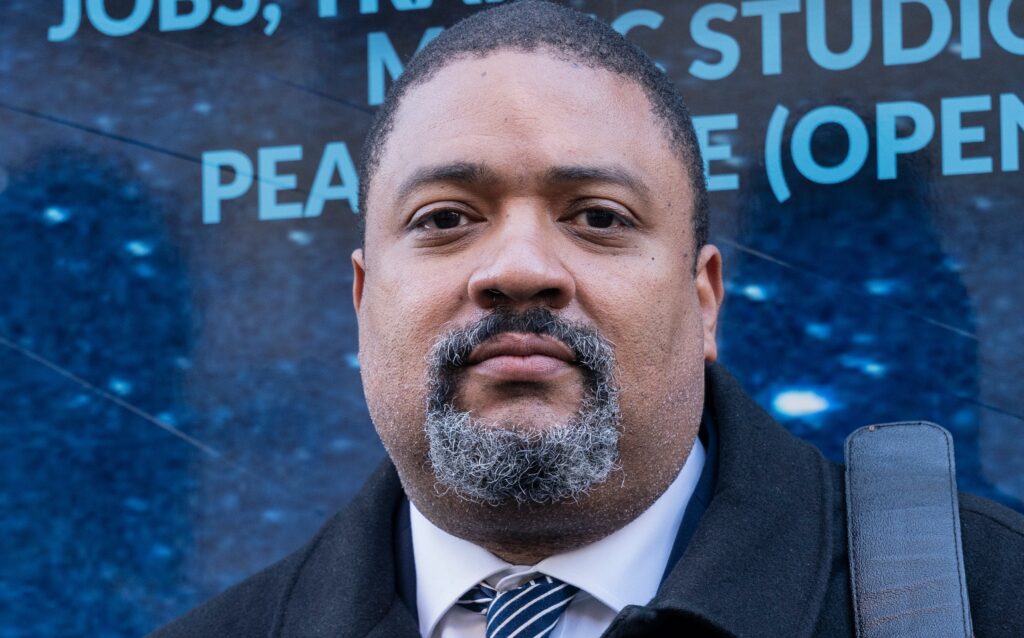Now you’re seeing why Alvin Bragg went with this case against Trump instead of the Pomerantz case against Trump

When incoming Manhattan District Attorney Alvin Bragg decided last year that he wouldn’t file charges against Donald Trump in the criminal case that respected attorney Mark Pomerantz had built, it brought a ton of heat on Bragg – even though Bragg promised that the Trump probe was “ongoing.” It even prompted numerous folks on social media to make up unhinged conspiracy theories about how Bragg was being bribed or blackmailed by Trump.
Sure enough, Bragg’s probe was ongoing, just as he said it was. Now Bragg is on the verge of criminally indicting Donald Trump in a different matter. And on Monday, everyone saw why Bragg went with this new case against Trump instead of the old Pomerantz case against Trump.
After Trump’s witness Robert Costello made a series of last minute claims that supposedly cast doubt on the credibility of Michael Cohen’s grand jury testimony, Bragg promptly produced David Pecker on Monday as a grand jury witness who could corroborate Cohen’s testimony. Just like that, Cohen’s testimony was validated, and Trump’s Costello defense was down the tubes.
That’s because this criminal case has numerous inside witnesses for the prosecution. Cohen has been getting all the public attention. But over the past month various media outlets have reported that everyone from Hope Hicks to Kellyanne Conway to, yes, David Pecker, were witnesses for the prosecution. Pecker had reportedly already testified once about Trump’s guilt, and on Monday, Bragg brought Pecker back to specifically vouch for Cohen’s testimony. After all, it was Trump, Cohen, and Pecker who were at the center of this scheme. Cohen and Pecker can vouch for each other, meaning the jury doesn’t have to take either of them at their word. And that’s before getting to the various other witnesses for the prosecution.
Contrast all of this with the earlier Trump tax fraud case. It was easy to get a conviction against Allen Weisselberg, because there was documentary proof that he knowingly carried out the scheme. So it didn’t matter that Trump Organization Controller Jeff McConney was the only real inside witness.
But if there’s documentary proof that Trump was in on the scheme, Weisselberg is still sitting on it. So with all due respect to Pomerantz’s legal prowess, the case he case he built would still have largely come down to the credibility of McConney. If Trump had some dirt up his sleeve against McConney – entirely realistic given that he worked for Trump for decades – Trump could have used that at trial to discredit McConney, and that would have meant a likely acquittal.
If Allen Weisselberg gets tired of sitting in prison and ever decides to provide testimony and evidence of Trump’s guilt in the tax fraud case, then it would instantly become a winner. Weisselberg and McConney would both be singing the same tune, making it far easier for the jury to believe them, and far harder for Trump to discredit either of them. But Weisselberg still isn’t cooperating, and you can’t do much more to try to force someone to cooperate than put them in prison, so it would have been a case with high odds of acquittal.
There are various thoughts on how the criminal justice system should work, but this is how it actually works. America has a long history of trying to nail crime bosses on whatever charges can actually stick. Donald Trump is no different in that sense. The previous Manhattan criminal case prepared against him was risky and had high odds of acquittal. The current Manhattan criminal case against him has so many overlapping layers of witnesses against Trump, it’ll make it very difficult for him to mount a defense, and is thus far more likely to put him away.
